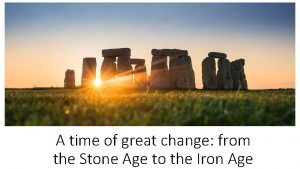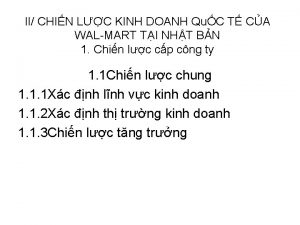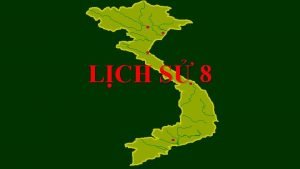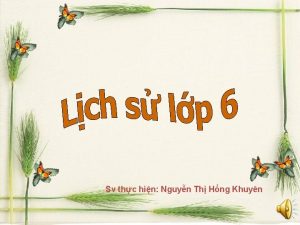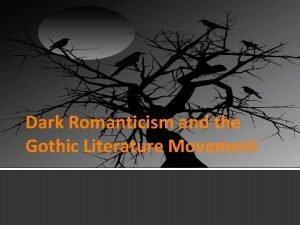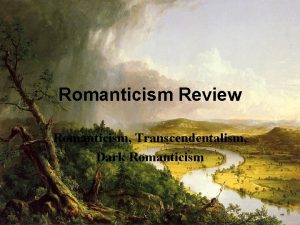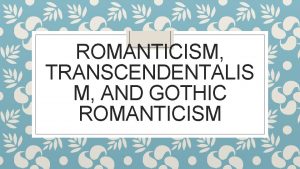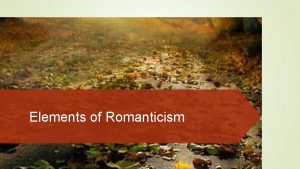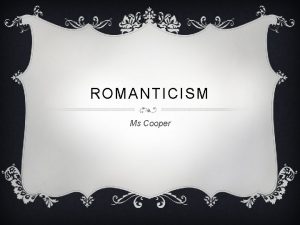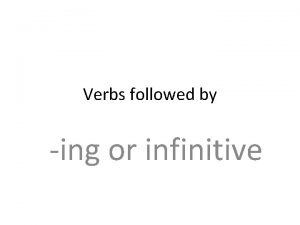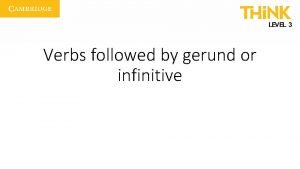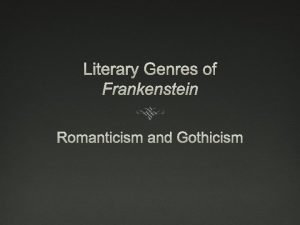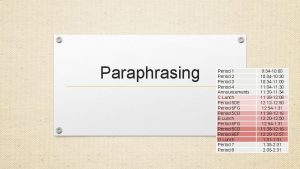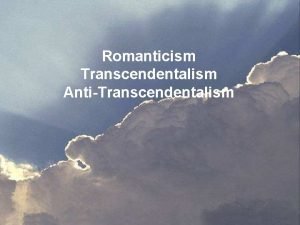ROMANTICISM Romanticism literary period that followed the Age












- Slides: 12

ROMANTICISM

Romanticism ◦ literary period that followed the Age of Reason in America. ◦ Due to the fact that the country was now established, writers moved their focus away from political matters and governmental ideas, and began to focus on other aspects of life ◦ Which included, emotions, possibilities, imagination

Characteristics of American Romanticism ◦ Values feeling and intuition over reason ◦ Places faith in inner experience and the power of the imagination ◦ Shuns the artificiality of civilization and seeks unspoiled nature ◦ Prefers youthful innocence to educated sophistication ◦ Champions individual freedom and the worth of the individual ◦ Contemplates nature’s beauty as a path to spiritual and moral development ◦ Looks backward to the wisdom of the past and distrusts progress ◦ Finds beauty and truth in exotic locals, the supernatural realm, and the inner world of the ◦ imagination

Characteristics ◦ Looks backward to the wisdom of the past and distrusts progress ◦ Finds beauty and truth in exotic locals, the supernatural realm, and the inner world of the imagination

Types of Literature ◦ Short stories ◦ Novels ◦ Poetry ◦ Essays

Big Picture ◦ Romantic VIEW OF MAN: ◦ Focus on the individual and his inner world (imagination and emotions).

Dark Romanticism ◦ “Dark Romantics are much less confident about the notion perfection is an innate quality of mankind, as believed by Transcendentalists. “ ◦ Dark Romantics present individuals as prone to sin and self-destruction, not as inherently possessing divinity and wisdom.

Edgar Allen Poe ◦ Never really knew is parents. Mom died when he was three and dad left the family ◦ n late 1830 s, Poe published Tales of the Grotesque and Arabesque, a collection of stories. ◦ contained most of Poe’s tales, including "The Fall of the House of Usher, " "Ligeia" and "William Wilson. "

Cont’d ◦ Poe launched the new genre of detective fiction with 1841's "The Murders in the Rue Morgue. " A writer on the rise, he won a literary prize in 1843 for "The Gold Bug, " a suspenseful tale of secret codes and hunting treasure. ◦ became a literary sensation in 1845 with the publication of the poem "The Raven. " It is considered a great American literary work and one of the best of Poe's career. ◦ Poe explored some of his common themes—death and loss. An unknown narrator laments the demise of his great love Lenore.

Herman Melville • Herman Melville, the third child of Allan and Maria Gansevoort Melvill's eight, was born into a socially connected New York family. • mid-1830 s, Melville had already begun writing, but continued financial problems for the family forced Herman to focus primarily on work. • Moby Dick was finally published in London in October 1851 and a month later in America, but it brought its author neither acclaim nor reward. •

The Whale • Moby Dick was finally published in London in October 1851 and a month later in America, but it brought its author neither acclaim nor reward. • After his death, Moby Dick finally earned critical acclaim

Works Cited ◦ "Dark Romanticism. " - New World Encyclopedia. Web. 28 Apr. 2016. ◦ "Melville, Herman. " Melville Biography. Web. 28 Apr. 2016. ◦ "Romanticism. " - New World Encyclopedia. Web. 28 Apr. 2016.
 Iron age bronze age stone age timeline
Iron age bronze age stone age timeline Iron age bronze age stone age timeline
Iron age bronze age stone age timeline Phân độ lown
Phân độ lown Block nhĩ thất độ 2 mobitz 2
Block nhĩ thất độ 2 mobitz 2 Thể thơ truyền thống
Thể thơ truyền thống Thơ thất ngôn tứ tuyệt đường luật
Thơ thất ngôn tứ tuyệt đường luật Chiến lược kinh doanh quốc tế của walmart
Chiến lược kinh doanh quốc tế của walmart Tìm vết của đường thẳng
Tìm vết của đường thẳng Con hãy đưa tay khi thấy người vấp ngã
Con hãy đưa tay khi thấy người vấp ngã Tôn thất thuyết là ai
Tôn thất thuyết là ai Gây tê cơ vuông thắt lưng
Gây tê cơ vuông thắt lưng Sau thất bại ở hồ điển triệt
Sau thất bại ở hồ điển triệt Introduction to dark romanticism american gothic
Introduction to dark romanticism american gothic

